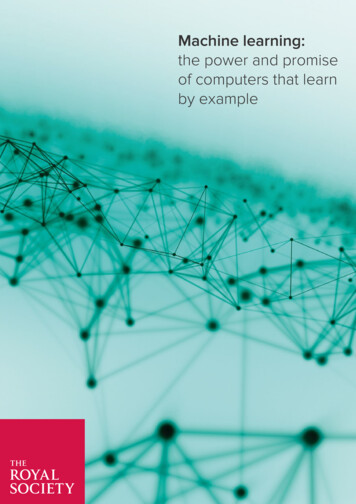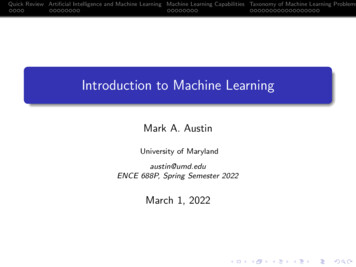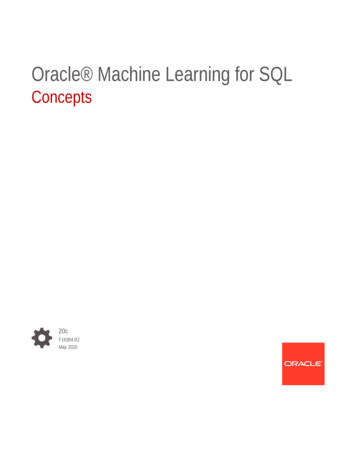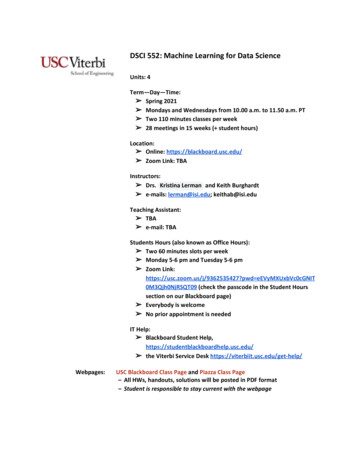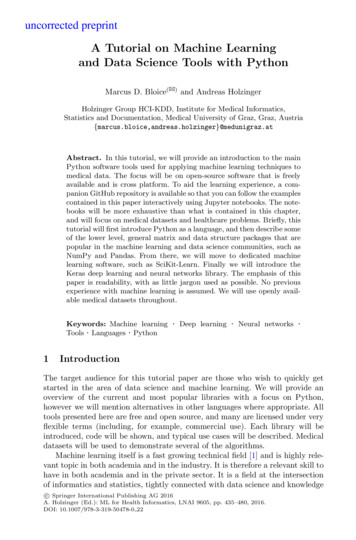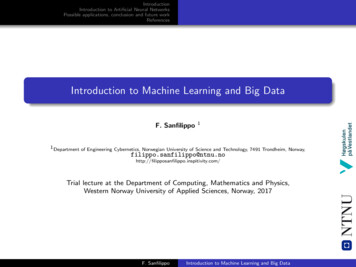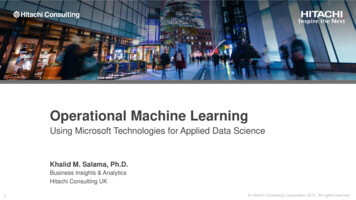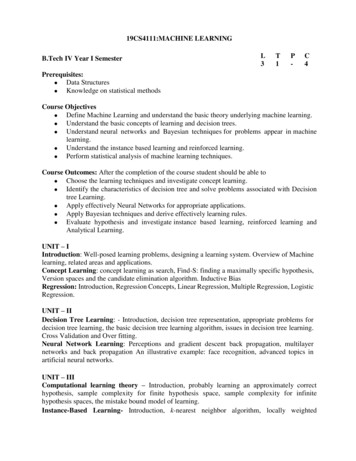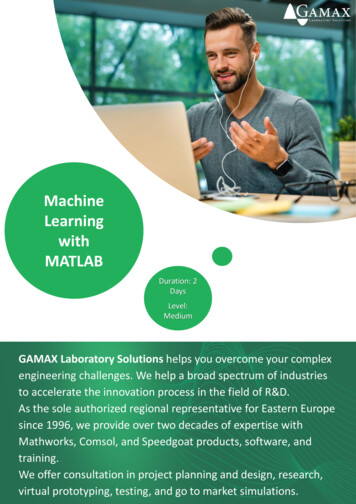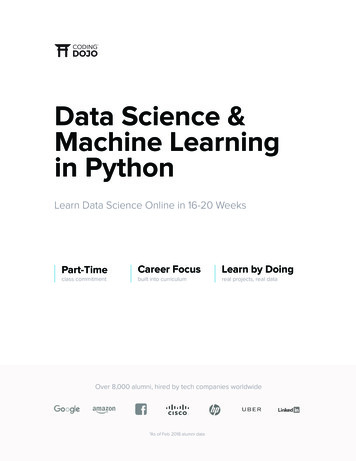
Transcription
Data Science &Machine Learningin PythonLearn Data Science Online in 16-20 WeeksPart-TimeCareer FocusLearn by Doingclass commitmentbuilt into curriculumreal projects, real dataOver 8,000 alumni, hired by tech companies worldwide*As of Feb 2018 alumni data
OverviewTake a deep dive into the fundamentalsof data science and machine learning inPython over 16 or 20 weeks. You’ll gaina comprehensive understanding of theentire data science process from end-toend, including data prep, data analysisand visualization, as well as how to applymachine learning algorithms to varioussituations or tasks.You’ll walk away with a project portfolioshowcasing your data science acumenas well as an understanding of one of thefastest growing job sectors out there.Designed for the Real WorldLearn By DoingHands-On TrainingA practical, accelerated curriculum designedfor you to fix real-work problems by buildingreal Data Science projects and solutions. You’lltackle over 100 interview-style questions so thatyou’re fully prepared for the job search.Learn modern Data Science through hands-onassignments, projects, and mentorship fromyour instructor. Lectures are always live. Youalso have to access to TAs.Core Concepts, Real Data-SetsEnd-to-End, Extensive CurriculumIn 16 weeks, you’ll learn the principle conceptsand technologies behind modern Data Science,and work on real data-sets and problems to putyour learning into practice.We’ll cover the full Data Science process andthe technologies to do the job, from data prepwith Python libraries, to data modeling inScikit-Learn, to visualization and presentation.
Data Science CurriculumPython & Machine LearningWEEK 1Python for Data ScienceLearn the Python fundamentals needed for datascience.WEEK 2Manipulating and UnderstandingDataLearn how to load, clean, and manipulate datausing the Python library Pandas. Additionally, youwill learn the strengths and weaknesses of usingPython to manipulate data.WEEK 3Exploratory VisualizationsBuild visualizations to support exploratory dataanalysis (EDA.) Not only understand your data, butalso how to communicate results to stakeholders.WEEK 4Explanatory VisualizationsLearn how to use Python to create high-qualitygraphs to share with stakeholders and effectivelycommunicate your findings.WEEK 5Intro to Machine LearningWhat is machine learning and why should you usethe Python library Scikit-Learn for Machine Learning? Topics include types of machine learning,how to format your data to be acceptable for analgorithm, and how to train an algorithm.WEEK 6Regression ModelsLearn about tree-based machine learning algorithms, how to tune them to maximize their performance, and the strengths and weaknesses ofeach algorithm. Additional topics include featureselection for machine learning, and comparingmachine learning algorithms.WEEK 7Classification ModelsLearn about the logistic regression algorithm andget a visual understanding of how the algorithmworks. Additional topics include: logistic regression for multiclass classification, L1 and L2 regularization, and hyperparameter tuning the algorithmslearned so far.WEEK 8Gradient Boosting MachinesYou’ll learn about gradient boosting algorithms,why they are so performant, and begin withKaggle competitions.
Data Science CurriculumPython & Machine LearningWEEK 9WEEK 13Clustering AlgorithmsIntro to DatabasesLearn about unsupervised learning and itsapplications. Then, explore clustering algorithms and how to tune them and understand thestrengths and weaknesses of each.Become familiar with entity relationship diagrams(ERD) and learn the advantages of using arelational database. Learn intermediate SQLqueries to access and aggregate information.WEEK 10WEEK 14Uses of Dimensional ReductionIntro to ETLWhat is dimensionality reduction? Learn how touse it for data visualization, to speed up machinelearning algorithms, and to understand data better.Explore Principal Component Analysis (PCA) andfeature engineering techniques.Develop an understanding of the process ofextracting, transforming, and loading data.WEEK 11Learn tools for statistical analysis including measures of central tendency, variance and standarddeviation and comparing means.Intro to Deep LearningLearn about why deep learning has transformedindustries, various deep learning frameworks, andwhen to use deep learning techniques. Topicsinclude recurrent neural networks (RNN) and Convolutional Neural Networks (CNN).WEEK 12Intro to SQL for Data ScienceWorking with databases is an essential part ofbeing a data analyst, data scientist, and dataengineer. This unit will cover how to perform SQLqueries and use SQLalchemy and SQLite.WEEK 15Introduction to StatisticsWEEK 16Model AssumptionsExplore model assumptions and how to test forthem. Apply this knowledge to choose the appropriate model for a data set.
Data Science CurriculumPython & Machine LearningWEEK 17Model Interpretations & InsightsExtract, visualize, and interpret model importancesthen apply model explanation tools to improverecommendations to stakeholders.TechnologiesCoveredTechnologies subject tochange based on studentneeds and hiring factorsGoogleColaboratoryPandasTime Series AnalysisPythonFoliumIdentify, pre-process, and plot time series datawithin Python. This week explores rolling statistics,aggregation, and seasonal trends.NumPyMatplotlibWEEK 11SeabornLightGBMScikit LearnGX BoostSciPyTensorFlowStats ModelLimeWEEK 18Using SQL with PythonWorking with databases is an essential part ofbeing a data analyst, data scientist, and dataengineer. This unit will cover how SQL and Pythonwork together.WEEK 19Introduction to TableauWelcome to Tableau! Transform, explore, andanalyze data within Tableau. Then, learn how tocreate high quality visualizations in the program.WEEK 20Dashboards in TableauCreate an interactive, storytelling data dashboardwithin Tableau.Tableau
How to Enroll13Explore2Schedule a Q&A call withAdmissions to get quickanswers about the bootcampor join the next open house.Complete your Interview4Schedule an interview withadmissions. The interview isnon-technical - no technicalexperience is required.ApplyReady to join? Submityour application and pickyour start date to join.Deposit to EnrollIf accepted, submit yourdeposit to save your seat andgain access to bootcamp prepmaterials for your start date.Apply NowFinancing OptionsSchedule a call with an Admissions Advisor to discusswhich payment or financing option is right for you.TALK TO USPay in FullInstallments3rd Party FinancingSave on tuition bypaying in full uponenrollmentSpread payments over thecourse with standard andcustom installment plansFinance bootcamp witha third party loan from avariety of lenders
Machine Learning in Python Learn Data Science Online in 16-20 Weeks Over 8,000 alumni, hired by tech companies worldwide *As of Feb 2018 alumni data Part-Time class commitment Career Focus built into curriculum Learn by Doing real projects, real data. Overview Tae a deep dive into the fundamentals of data science and machine learning in Python over 1 or 2 wees oull gain a comprehensive .
